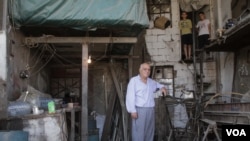In Lebanon’s agricultural heartland, mechanic Imad Suleiman surveyed the rows of slowly rusting trucks and lamented the disaster that has struck his business.
Suleiman works as a mechanic at a truck stop in the Bekaa region that once served as a crucial stop-off point for vehicles that transported Lebanese farmers’ produce around the Arab world. With Lebanon’s only land crossing to the region closed due to advances by anti-regime fighters in the Syrian war, however, the trucks have stopped coming.
“My son has had to leave the business and I can’t afford to send my grandchildren to school,” he said. “I’ve been here since 1987 and this year has been the worst. I can’t even support myself.”
This month, with businesses at home and market share abroad in peril, the state launched a multi-million-dollar lifeline aiming to help shift export to sea routes.
For many whose fortunes have been hit by a war in which they have no part, however, the future remains uncertain.
Overrun
The Nassib land border, which gave Lebanon an overland link to Jordan through Syria, was overrun by rebel forces in April. Its loss severed the last land trade link to vital markets for Lebanese businesses.
Nassib Ghobril, the chief economist of the Byblos Bank Group, cited the closure as playing a role in Lebanon’s lowered predicted growth rates for 2015 from 2 percent to “near zero.”
“It has created problems and compounded existing ones caused by the war,” he added.
It is the farming sector, however, that has been particularly vulnerable, with local media reporting agricultural exports dropping 35 percent in the two months following the closure.
While other industries shifted to exporting by sea, for many in agriculture, the longer journey times made the switch impossible as their goods would have rotted before reaching foreign shores.
A high speed ferry set up following the closure to export produce from Lebanon’s northern city of Tripoli cut journey times, but was too expensive for many.
Some, like Suleiman, have felt the sharp end of the closure for months. For others, it is a threat looming on the horizon.
“The problem is coming,” said Ramiz Osseiran, who represents farmers in south Lebanon for whom oranges and bananas are the staple produce. He explained that both crops, 65 percent of which are usually sold for export, would be ripening within three months.
“All the families work in agriculture, and they have done so here for more than 100 years. They have no other work they can do,” he warned. “There’s no alternative.”
Help at hand
The government overcame its usual paralysis to approve a $14 million lifeline to businesses seeking to export, which it recently started offering. This will go to lower the cost of the sea transport, with up to $2,150 offered per truck.
The scheme is “essential,” according to Nabil Itani, chairman of the Investment Development Authority of Lebanon, the government-backed body offering the subsidies. Itani said Lebanon’s economy had been “infected” by nearby conflicts.
"We needed to do this just to maintain our position, because the Gulf area depends on our produce, especially in the agriculture sector," he said.
This dependency is mutual; Arab countries make up about 45 percent of Lebanon’s export market.
Just a band-aid
With the subsidy set to last only seven months, Itani admitted the measure is effectively a bandage. The broader issue of Lebanon’s land route isolation because of the Syrian war is, he said, “out of our hands.”
“It will help us maintain our position, but the situation needs more. The competition [for market share in the region] is very high.”
For many of Lebanon’s industrialists, April's closure accelerated a movement toward the ports already started by the impact of a war that often made land routes through Syria unreliable and costly.
Osseiran says he has faith that farmers and those who work with them will learn to cope, with or without the government; but all agree the stakes for thousands of families who rely on their produce reaching foreign markets are high.
Back at the truck stop in Bekaa, Ayman Halawi tells a now familiar tale of struggle. The owner of refrigerated trucks has been out of work since March. Having sold seven of his 13 trucks, he started to fear that he too would struggle to provide for his loved ones.
“My business had been completely frozen by the closure. It was catastrophic,” he said.
Halawi welcomed news of the subsidy and called for further support in the form of providing more fast-track ferries; but, he will not be restoring his fleet to its full glory just yet.
“It’s good news for me and thousands like me,” he said.
“But the agricultural industry won’t be back to where it was until that land border opens again.”
For that to happen, a situation beyond the reach of Lebanon’s government will need to change.
LEBANON —









